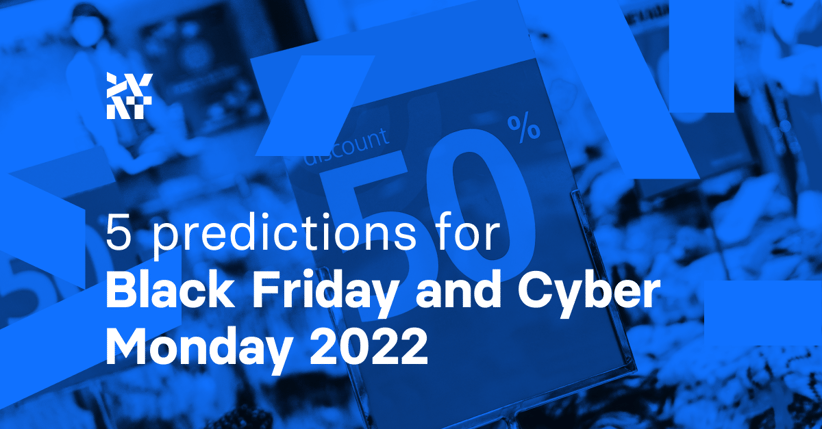Black Friday and Cyber Monday 2022 are just around the corner, and that means the busiest shopping days for eCommerce will soon arrive. In 2022, Black Friday will be on November 25, and Cyber Monday will fall on November 28. Of course, these days are just placeholders for a sale season that will take place over a minimum of several weeks.
This year we can expect some changes in several areas when compared to previous years. With the pandemic still present, rising inflation, and a possible looming recession, retailers in both eCommerce and brick-and-mortar stores will need to adapt their strategies to fit the current situation.
To help with that, I’ve come up with some predictions about what to expect for Black Friday and Cyber Monday this year.
You’ll see some of the best deals you’ve ever seen on Black Friday and Cyber Monday 2022
Even with skyrocketing inflation, prices will be better than last year. Last year, retailers had supply chain issues, and, because of that, demand was high, so they didn’t offer as deep of discounts. This year, many retailers, including Walmart, Target, Gap, Nordstrom, Macy’s, and Kohl's, have a huge glut of inventory. If they’re unable to unload all of that inventory in the coming month, which is unlikely, it’ll likely be offered up during Black Friday and Cyber Monday at steep discounts.
Amazon Prime Day, which occurred on July 12 and 13, is a good indicator of what to expect for Black Friday and Cyber Monday. Responding to the high inflation, Amazon offered some of the heaviest discounts since it started Prime Day in 2015. In some categories, the discounts were up to 50% more than in 2021, while most categories saw at least a 15% increase. The strategy worked, and the online giant saw its average order value increase by at least 16% over the previous year.
Sales will be stretched out over a longer period
This is partly due to retailers having so much inventory. It’s also been a trend in recent years for retailers to start their sales much earlier, in some cases as soon as October or early November, and run those sales later. That’s very likely to continue this year.
Of course, retailers are also reacting to what consumers want. In fact, a strong majority of consumers, 83%, said that they start shopping for the holidays way earlier than Black Friday, and many say they’re also actively looking for deals way later than on Cyber Monday. Additionally, shoppers are buying throughout the entire weekend. Although Small Business Saturday, the day after Black Friday, and the following Sunday saw a modest drop in sales from the previous year, it remains an important weekend for retailers that should be capitalized on.
This year won’t break any sales records
Historically, Black Friday and Cyber Monday always broke the sales records from the previous year. Don’t expect that to happen this year. Although Cyber Monday set a record for online sales for that single day last year, Black Friday sales went down for the first time. Additionally, customers are pulling back from unnecessary purchases and spending less in general.
In 2022, sales in eCommerce are also expected to go down for the first time. That comes as a surprise for many because a previous forecast projected $481 billion more in sales by the end of the year. Of course, the previously mentioned inflation, possible recession, and economic uncertainty rear their ugly heads again. On top of that, online prices for many items have also dropped this year.
“Wavering consumer confidence and a pullback in spending, coupled with oversupply for some retailers, is driving prices down in major online categories like electronics and apparel.”
Patrick Brown, Vice President of Growth Marketing and Insights at Adobe
For those retailers counting on Black Friday and Cyber Monday to bail them out this year, marketing efforts and preparation will be critical.
More shoppers will be buying for themselves
In 2021, 72% of Black Friday shoppers bought something for themselves. That’s up from 61% in 2019. Encouraging shoppers to “treat yo self” will be critical, especially this year, in order for retailers to have a successful Black Friday and Cyber Monday. One of the biggest groups of self-gifting shoppers to pursue are Millennials.
"One of the key trends in this space is the Millennials. They are still the largest group who take advantage of sales across the board."
Kathy Allen, National Retail Federation
So, how can you appeal to these shoppers? Generally, the type of purchases being made on Black Friday and Cyber Monday has shifted. More expensive items, like home appliances, TVs, computers, and other electronic devices, have given way to items like clothing, health and beauty items, and household goods. Spotlight those items in your marketing efforts.
Also, consider providing loyalty rewards or freebies for shoppers to encourage them to buy more and become repeat customers. For example, many stores offer a free gift card if a certain amount has been spent. Regardless, no matter how a business chooses to do it, get in front of these shoppers through an early and personalized marketing strategy.
User experience and trust will matter more than ever
Although sales have, with the exception of last year, increased for Black Friday and Cyber Monday, the number of shoppers has gone down. In fact, in the previous two years, between 2019 and 2021, there were 15% less shoppers on those days. Why? One reason, as mentioned above, is the extended period of time for sales.
However, another important reason is that shoppers no longer believe the best prices are on those days. According to a survey of 1,000 shoppers in the U.K., 62% said they didn’t think that Black Friday prices were any better than the rest of the year. They’re not wrong. In a study from 2019, just 5% of Black Friday sales offered a lower price than what was available during other times of the year. These factors have also helped create a lack of interest in Black Friday and Cyber Monday for many shoppers.
In short, trust has increasingly become a factor.
How can that be fixed? It starts with repairing that trust by convincing shoppers that their sales are truly a good deal. What’s the easiest way to do that? Offer genuinely good prices that aren’t just overly exaggerated sales pitches. In other words, if you promise that these are the best prices of the year, deliver on that promise. Another way to rebuild that trust is to offer those potential customers a targeted user experience by personalizing the shopping journey and doubling down on providing a seamless mobile experience.
Adapt and survive
Naturally, as with any predictions, take these predictions with a grain of salt. We live in a dynamic and fluid time, so everything can change at the drop of a hat. That being said, these predictions will help you prepare for the boost in sales that is traditionally a big part of Black Friday and Cyber Monday for retailers. That’s not going away, despite fluctuating consumer sentiment.
This is the first article in a series that Divante will be publishing about Black Friday and Cyber Monday on our blog. If you want to take a look at articles we’ve published about Black Friday and Cyber Monday in previous years, hop on over to this page.
Published September 16, 2022












